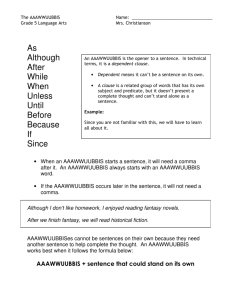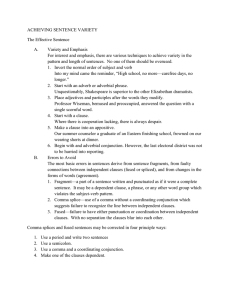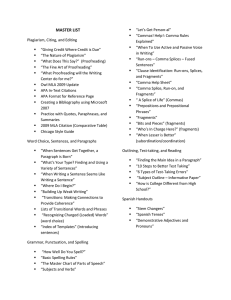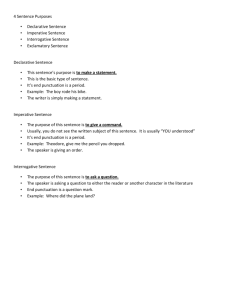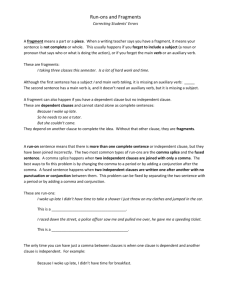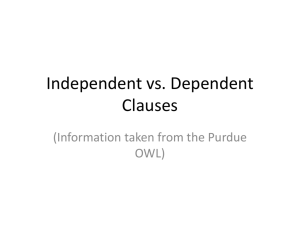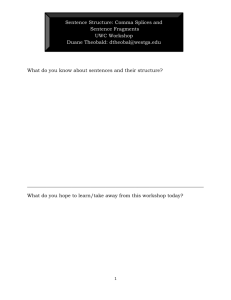Comma Splices
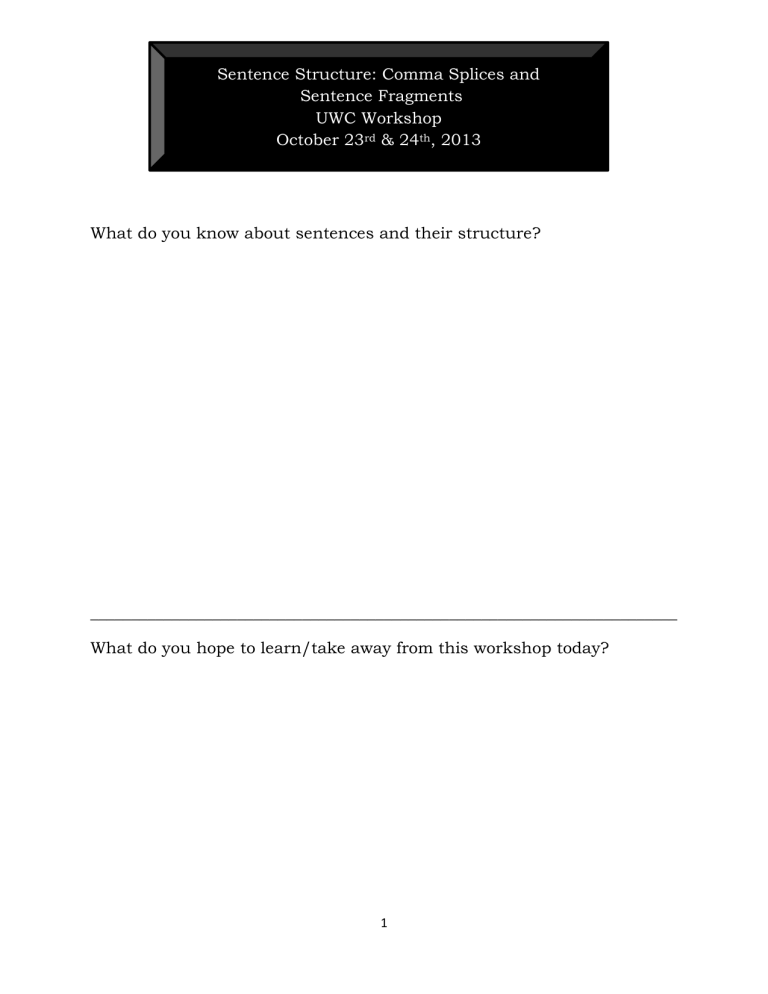
Sentence Structure: Comma Splices and
Sentence Fragments
UWC Workshop
October 23 rd & 24 th , 2013
What do you know about sentences and their structure?
________________________________________________________________________
What do you hope to learn/take away from this workshop today?
1
Let’s start at the beginning…
What are independent clauses/dependent clauses?
Independent clause…
Dependent clause…
Types of Sentences:
Simple Sentence-contains one independent clause (a defined subject and verb can be found) o Example:
Compound Sentence-contains two or more independent clauses; can be joined together by a coordinating conjunction o Example:
Complex Sentence-contains one independent clause plus one or more dependent clause o Example:
Compound-Complex-contains two independent clauses and one or more dependent clause o Example:
Sentence Practice: Read each sentence carefully and identify what kind of sentence it is.
1.
Robert moved in, and I moved in a month later.
2.
Sarah found her cat in a tree.
3.
As I drove the car, Carlos changed the radio station, and he began to dance.
4.
Even if I leave early, I will still be late for work.
2
**Now that we understand exactly what a sentence is, we can begin to look at problems that may occur when writing one!**
Comma Splices
A comma splice is...
How to spot a comma splice: A comma splice happens when you use a comma to join two independent clauses. That's a no-no in grammar. Commas are used for separating, not connecting.
How to fix a comma splice:
Consider the following sentence:
My family bakes together nearly every night, we then get to enjoy everything we make together. o Is this correct? Why or why not?- o How can we fix it?
Correction #1: My family bakes together nearly every night. We then get to enjoy everything we make together. (break the sentence into two separate sentences)
Correction #2: My family bakes nearly every night, and we then get to enjoy everything we make together. (add a coordinating conjunction and a comma)
Correction #3: After my family bakes together nearly every night, we get to enjoy everything we make together. (add a subordinating conjunction and a comma)
3
Let’s Practice!
The following sentences contain comma splices. For each sentence, suggest two possible revisions.
1.
I didn’t like the movie, it was way too long.
2.
She and Jerry are getting married in the fall, they didn’t want a summer wedding.
3.
My favorite bands are all really loud, playing loud music is good for stress relief.
Also, when considering when to use a comma, consult the (comma)ndments!
____________________________________________________
Sentence Fragments
A sentence fragment...
Sometimes, fragments may be pieces of sentences that have become disconnected from the main clause. These can be fixed in several ways. o Fragment: Purdue offers many majors in engineering.
Such as electrical, chemical, and industrial engineering. o Possible Revision:
4
o Fragment: I need to find a new roommate. Because the one I have now isn’t working out too well. o Possible Revision:
Also, remember that some fragments are not clearly pieces of sentences that have been left unattached to the main clause; they are written as main clauses but lack a subject or main verb. o Examples:
No Main Verb: A story with deep thoughts and emotions. (FRAGMENT)
Possible Revision:
No Subject: When the ultimate effect of all advertising is to sell the product. (FRAGMENT)
Possible Revision:
Let’s Practice!
Read the following sentences and determine whether they are complete sentences or fragments.
1.
While I was driving to work and there was an accident on the road.
2.
Wherever I go, I take my cell phone with me.
3.
As soon as I finish this grammar exercise, I will eat lunch.
4.
Whether I complete this course and get credit for it in the fall.
5.
So that I don't spend too much time on any of my projects, I make sure I take frequent breaks.
5
A Few Final Thoughts:
Remember that a comma splice is when two independent
clauses are connected with only a comma. o Keep in mind that there are several ways to correct a comma splice, so know what they are and how to correctly use them. o Also, make sure to follow the (COMMA)NDMENTS!!
Remember that a sentence fragment fails to be a sentence because it cannot stand alone. It also does not contain even one independent clause. o Sometimes, fragments may be pieces of sentences that have become disconnected from the main clause. o Also, remember that some fragments are not clearly pieces of sentences that have been left unattached to the main clause; they are written as main clauses but lack a subject or main verb.
6
